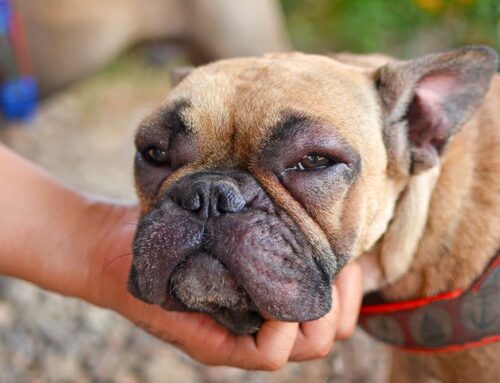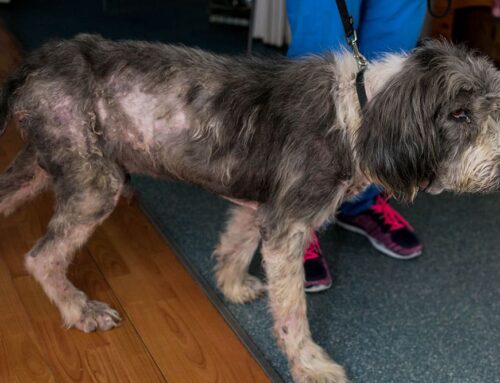You may have noticed your dog panting when they’re excited, anxious, or hot. Panting is a normal canine behavior, serving as a critical mechanism for regulating body temperature and ensuring overall physiological stability. Our MountainView Veterinary Hospital team explains panting’s intricacies, how the behavior functions, and why some dogs pant more than others.
Why dogs pant
Panting is a rapid, shallow breathing process in which dogs inhale through their noses and exhale through their mouths, typically at a rate of 200 to 400 breaths per minute. Panting facilitates evaporative cooling, which is necessary since dogs have a limited number of sweat glands, primarily located on their paw pads. Physiological reasons why dogs need to pant include:
- Evaporative cooling — Through panting, air flows over the moist surfaces of a dog’s tongue, mouth, and upper respiratory tract. This airflow causes the moisture to evaporate, cooling the blood vessels in these areas. As the cooled blood circulates through the dog’s body, it helps lower their internal body temperature.
- Heat regulation — Panting is particularly critical because dogs, like many other animals, do not sweat through their skin the way people do. Instead, canines rely on panting to dissipate excess body heat generated from physical activity, high environmental temperatures, or stress.
- Oxygen intake — While panting’s primary purpose is to cool the body, the behavior also increases oxygen intake. During intense exercise or excitement, dogs need more oxygen to fuel their muscles and maintain metabolic processes. Panting helps meet this increased demand.
Excessive panting in dogs
Several factors influence why some dogs pant more than others, which can be broadly categorized into physiological, environmental, and health-related aspects. These factors include:
- Breed and anatomy — Some breeds are prone to panting as a result of their anatomical features. Brachycephalic breeds, such as French bulldogs, pugs, and Boston terriers, have short snouts and narrow airways, which make breathing less efficient. Brachycephalic breeds pant quickly and heavily to regulate their body temperature and oxygen levels.
- Size and weight — Large-breed dogs often pant more than smaller breeds because they generate more body heat and have a larger body mass to cool. Additionally, overweight or obese dogs may pant excessively as the extra fat acts as insulation, which makes cooling down difficult. Obesity also strains the heart, lungs, and other organs.
- Physical activity — Active and high-energy dogs naturally pant more during and after exercise as their bodies work harder to dissipate the heat generated by their muscles. A dog’s physical activity’s intensity and duration directly impact how much they pant.
- Hot and humid weather — High temperatures and humidity can cause dogs to pant more. In hot and humid climates, the effectiveness of their internal cooling mechanisms diminishes, requiring dogs to pant intensely to achieve the same cooling effect.

- Stress and anxiety — Panting can also indicate that a dog is stressed, fearful, or anxious. Situations, such as thunderstorms, fireworks, sirens, car rides, or visits to the veterinary clinic, can trigger panting as a physiological response.
- Excitement — Dogs may pant more when happy and excited. For example, dogs often pant when they see a fellow pet companion or owner, or are about to receive a treat or cherished toy.
- Health conditions — Underlying health issues can cause a dog to pant quickly. Medical conditions, such as heart disease, respiratory disorders, and obesity, can make breathing difficult for affected dogs, leading to excessive panting. Pain, fever, or metabolic disorders, including Cushing’s disease, can also cause a dog to pant quickly.
Panting is an essential mechanism for dogs, enabling them to regulate their body temperature and maintain physiological balance. While panting is normal, excessive panting can indicate that your dog has an underlying condition that requires veterinary attention. By understanding the factors influencing panting, you can help ensure your four-legged friend remains healthy and comfortable, especially in hot weather or anxiety-inducing situations. Has your dog been panting excessively? Schedule an appointment with our MountainView Veterinary Hospital team in Denville and Denville, NJ so we can assess your furry friend’s health.









Leave A Comment